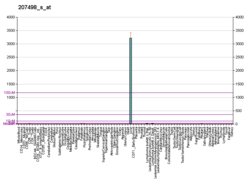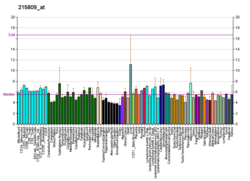CYP2D6
CYP2D6| CYP2D6 | |||||||||||||||||||||||||
|---|---|---|---|---|---|---|---|---|---|---|---|---|---|---|---|---|---|---|---|---|---|---|---|---|---|
 | |||||||||||||||||||||||||
| |||||||||||||||||||||||||
| 식별자 | |||||||||||||||||||||||||
| 별칭 | CYP2D6, CPD6, CYP2D, CYP2D7AP, CYP2D7BP, CYP2D7P2, CYP2D8P2, CYP2DL1, CYPIID6, P450-DB1, P450C2D, P450DB1, cytochrome P450 family 2 subfamily D member 6, Cytochrome P450 2D6 | ||||||||||||||||||||||||
| 외부 ID | OMIM: 124030 호몰로진: 133550 GeneCard: CYP2D6 | ||||||||||||||||||||||||
| |||||||||||||||||||||||||
| |||||||||||||||||||||||||
| |||||||||||||||||||||||||
| 직교체 | |||||||||||||||||||||||||
| 종 | 인간 | 마우스 | |||||||||||||||||||||||
| 엔트레스 |
| ||||||||||||||||||||||||
| 앙상블 |
|
| |||||||||||||||||||||||
| 유니프로트 |
| ||||||||||||||||||||||||
| RefSeq(mRNA) |
| ||||||||||||||||||||||||
| RefSeq(단백질) |
| ||||||||||||||||||||||||
| 위치(UCSC) | Cr 22: 42.13 – 42.13Mb | n/a | |||||||||||||||||||||||
| PubMed 검색 | [2] | n/a | |||||||||||||||||||||||
| 위키다타 | |||||||||||||||||||||||||
| |||||||||||||||||||||||||
사이토크롬 P450 2D6(CYP2D6)은 인간에서 CYP2D6 유전자에 의해 암호화된 효소다. CYP2D6는 주로 간에서 발현된다. 실체성 니그라를 포함한 중추신경계 영역에서도 고도로 표현된다.
사이토크롬 P450 혼합기능 산화효소 시스템의 구성원인 CYP2D6는 체내에서 유전생균의 신진대사에 관여하는 가장 중요한 효소 중 하나이다. 특히 CYP2D6는 특정 기능 그룹(특히 히드록실화, 데메틸화, 탈킬화 등)의 추가 또는 제거를 통해 임상적으로 사용되는 약물의 약 25%를 대사 및 소거하는 역할을 담당한다.[3] CYP2D6는 또한 일부 프로드러브를 활성화시킨다. 이 효소는 또한 히드록시트리프타민, 신경스테로이드, 그리고 CYP2D6가 대사하는 m-tyramine과 p-tyramine과 같은 몇몇 내생 물질을 뇌와 간에서 도파민으로 대사시킨다.[3][4]
개인 간 CYP2D6 효소의 효율성과 양에 상당한 변화가 존재한다. 따라서 CYP2D6에 의해 대사되는 약물의 경우(즉, CYP2D6 기질) 특정 개인은 이러한 약물을 신속하게 제거하는 반면, 다른 개인은 천천히(불량 대사제)를 제거한다. 약물이 너무 빨리 대사되면 약의 효능이 저하되는 반면, 너무 느리게 대사되면 독성이 발생할 수 있다.[5] 따라서 CYP2D6에 의해 대사되는 속도를 고려하여 약물의 선량을 조정해야 할 수 있다.[6]
다른 약물은 CYP2D6 활성의 억제제 또는 CYP2D6 효소 발현 유도제로서 각각 CYP2D6 활성도의 감소 또는 증가를 유발할 수 있다. 만약 그러한 약물을 CYP2D6 기질인 두 번째 약물과 동시에 복용한다면, 첫 번째 약물은 약물-마약 상호작용이라고 알려진 것을 통해 두 번째 약물의 제거율에 영향을 줄 수 있다.[5]
유전자
이 유전자는 두 개의 사이토크롬 P450 유사 유전자(CYP2D7P 및 CYP2D8P) 근처에 있는 22q13.1 염색체에 위치한다.[7] 그 중 CYP2D7P는 유인원과 인간의 줄기 혈통인 CYP2D6에서 유래하였으며,[8] CYP2D8P는 카타린과 신세계원숭이 줄기 혈통인 CYP2D6에서 유래하였다.[9] 대안으로 다른 ISO 양식을 인코딩하는 분할된 대본 변형이 이 유전자에 대해 발견되었다.[10]
유전자형/형상형 가변성
CYP2D6는 주로 유전적 다형성 때문에 CYP들 사이에서 가장 큰 표현형적 가변성을 보여준다. 유전자형은 피험자에서 정상, 감소, 존재하지 않는 CYP2D6 기능을 설명한다. 현재 약리유전성 검사를 통해 CYP2D6 알레르기가 변동하는 환자를 식별할 수 있으며 임상 실습에서 광범위하게 사용되고 있는 것으로 확인되었다.[11] 특정 과목의 CYP2D6 기능은 다음 중 하나로 설명될 수 있다.[12]
- 신진 대사기 불량 – CYP2D6 기능이 거의 또는 전혀 없음
- 중간 대사물 – 빈약하고 광범위한 대사물 사이의 비율로 약물을 대사함
- 광범위한 대사물 – 정상 CYP2D6 기능
- 초음파 대사기 – CYP2D6 유전자의 여러 복사본이 표현되므로 정상 CYP2D6보다 큰 CYP2D6 기능이 발생한다.
환자의 CYP2D6 표현형은 종종 이물질화합물(선택적 CYP2D6 기질) 투여와 이물질화합물(4-hydroxydebrisoquine)의 후속 혈장 농도 측정을 통해 임상적으로 결정된다.[13]
개인의 CYP2D6 기능의 유형은 CYP2D6가 대사하는 여러 가지 약물에 대한 개인의 반응에 영향을 미칠 수 있다. 약물 반응에 대한 효과의 특성은 CYP2D6 기능의 종류뿐만 아니라, CYP2D6에 의한 약물의 처리로 인해 원래 약물과 유사하거나 강하거나 약하거나 전혀 효과가 없는 화학물질이 발생하는 정도에 따라 달라진다. 예를 들어 CYP2D6가 효과가 강한 약물을 효과가 약한 물질로 변환하면 신진대사(취약 CYP2D6 기능)가 약물에 대해 과장된 반응을 보이고 부작용이 강하며 반대로 CYP2D6가 다른 약물을 모화학물질보다 큰 물질로 변환하면 u가 된다.ltrapid 대사제(강력한 CYP2D6 함수)는 약물에 대한 과장된 반응과 강한 부작용을 가질 것이다.[14]
변동성의 유전적 근거
CYP2D6 매개 대사 변동의 유전적 근거는 22번 염색체에 위치한 CYP2D6 알레일이다. 특정 알레르기가 있는 피험자는 알레르기에 따라 CYP2D6 기능이 정상, 감소 또는 없음으로 나타난다. 현재 약리유전성 검사를 통해 CYP2D6 알레르기가 변동하는 환자를 식별할 수 있으며 임상 실습에서 광범위하게 사용되고 있는 것으로 확인되었다.[11] CYP2D6와 그 임상적 기능의 현재 알려진 알레르기는 PharmVar와 같은 데이터베이스에서 찾을 수 있다.[15]
| 선택된 알레르기에 대한 CYP2D6 효소 활성[16][15] | |
| 알레르 | CYP2D6 활동 |
| CYP2D6*1 | 정상의 |
| CYP2D6*2 | 정상의 |
| CYP2D6*3 | 없는 |
| CYP2D6*4 | 없는 |
| CYP2D6*5 | 없는 |
| CYP2D6*6 | 없는 |
| CYP2D6*7 | 없는 |
| CYP2D6*8 | 없는 |
| CYP2D6*9 | 줄었다 |
| CYP2D6*10 | 줄었다 |
| CYP2D6*11 | 없는 |
| CYP2D6*12 | 없는 |
| CYP2D6*13 | 없는 |
| CYP2D6*14 | 없는 |
| CYP2D6*15 | 없는 |
| CYP2D6*17 | 줄었다 |
| CYP2D6*19 | 없는 |
| CYP2D6*20 | 없는 |
| CYP2D6*21 | 없는 |
| CYP2D6*29 | 줄었다 |
| CYP2D6*31 | 없는 |
| CYP2D6*38 | 없는 |
| CYP2D6*40 | 없는 |
| CYP2D6*41 | 줄었다 |
| CYP2D6*42 | 없는 |
| CYP2D6*44 | 없는 |
| CYP2D6*47 | 없는 |
| CYP2D6*50 | 줄었다 |
| CYP2D6*51 | 없는 |
| CYP2D6*68 | 없는 |
| CYP2D6*92 | 없는 |
| CYP2D6*100 | 없는 |
| CYP2D6*101 | 없는 |
| CYP2D6 복제 | 증가된 |
민족적 변동요인자
민족성은 CYP2D6 가변성의 발생 요인이다. 간사이토크롬 CYP2D6 효소의 부족은 백인 개체군에서 대략 7~10%에서 발생하며, 아시아인과 아프리카계 미국인과 같은 대부분의 다른 인종군에서 각각 2%로 더 낮다.[17] CYP2D6 초파라피드 대사제의 발생은 중동과 북아프리카 인구 사이에서 더 큰 것으로 보인다.[18]
유럽계 혈통을 가진 백인(약 71%)은 CYP2D6 알레르기의 기능 그룹을 가지고 있지만, 기능적 알레르기는 아시아계 혈통 인구의 알레르기의 약 50%에 불과하다.[19]
때문에 그들은 아시아인들의 약 50%감소로 인해 제 기능을 하는 야드를 보유하고 있는 allele,[16]은 비 기능적 CYP2D6*4 것으로 보이이 가변성을 다양한 CYP2D6 alleles의 populations–approximately 백인의 10%중간 metabolizers 사이의 유행은 감소 CYP2D6 기능으로 인해의 차이점으로 여겨진다.P2D6*10 alle.[16]
리간즈
다음은 CYP2D6의 선택된 기판, 유도체 및 억제제 표이다. 에이전트 클래스가 나열된 경우 클래스 내에 예외가 있을 수 있다.
CYP2D6의 억제제는 다음과 같이 효력에 의해 분류될 수 있다.
- 강력한 억제제는 CYP2D6를 통해 대사되는 민감한 기질체의 혈장 AUC 값이 최소한 5배 증가하거나 간극이 80% 이상 감소하는 요인이다.[20]
- 중간 억제제는 CYP2D6를 통해 대사되는 민감한 기질체의 혈장 AUC 값이 최소한 2배 증가하거나 간극이 50-80% 감소하는 것을 유발하는 것이다.[20]
- 취약억제제는 CYP2D6를 통해 대사되는 민감 기질체의 혈장 AUC 값이 최소 1.25배, 2배 미만 증가하거나 간극이 20-50% 감소하는 요인이다.[20]
도파민 생합성
참조
- ^ a b c ENSG00000275211, ENSG00000280905, ENSG00000282966, ENSG00000283284, ENSG00000272532 GRCh38: Ensembl release 89: ENSG00000100197, ENSG00000275211, ENSG00000280905, ENSG00000282966, ENSG00000283284, ENSG00000272532 - Ensembl, May 2017
- ^ "Human PubMed Reference:". National Center for Biotechnology Information, U.S. National Library of Medicine.
- ^ a b Wang B, Yang LP, Zhang XZ, Huang SQ, Bartlam M, Zhou SF (2009). "New insights into the structural characteristics and functional relevance of the human cytochrome P450 2D6 enzyme". Drug Metabolism Reviews. 41 (4): 573–643. doi:10.1080/03602530903118729. PMID 19645588. S2CID 41857580.
- ^ Wang X, Li J, Dong G, Yue J (February 2014). "The endogenous substrates of brain CYP2D". European Journal of Pharmacology. 724: 211–8. doi:10.1016/j.ejphar.2013.12.025. PMID 24374199.
- ^ a b Teh LK, Bertilsson L (2012). "Pharmacogenomics of CYP2D6: molecular genetics, interethnic differences and clinical importance". Drug Metabolism and Pharmacokinetics. 27 (1): 55–67. doi:10.2133/dmpk.DMPK-11-RV-121. PMID 22185816.
- ^ Walko CM, McLeod H (April 2012). "Use of CYP2D6 genotyping in practice: tamoxifen dose adjustment". Pharmacogenomics. 13 (6): 691–7. doi:10.2217/pgs.12.27. PMID 22515611.
- ^ Ahmad, HI; Afzal, G; Jamal, A; Kiran, S; Khan, MA; Mehmood, K; Kamran, Z; Ahmed, I; Ahmad, S; Ahmad, A; Hussain, J; Almas, S (2021). "In Silico Structural, Functional, and Phylogenetic Analysis of Cytochrome (CYPD) Protein Family". BioMed Research International. 2021: 5574789. doi:10.1155/2021/5574789. PMC 8128545. PMID 34046497.
- ^ Wang, H; Tompkins, LM (September 2008). "CYP2B6: new insights into a historically overlooked cytochrome P450 isozyme". Current Drug Metabolism. 9 (7): 598–610. doi:10.2174/138920008785821710. PMC 2605793. PMID 18781911.
- ^ Yasukochi, Y; Satta, Y (2011). "Evolution of the CYP2D gene cluster in humans and four non-human primates". Genes & Genetic Systems. 86 (2): 109–16. doi:10.1266/ggs.86.109. PMID 21670550.
- ^ "Entrez Gene: CYP2D6 cytochrome P450, family 2, subfamily D, polypeptide 6".
- ^ a b Dinama O, Warren AM, Kulkarni J (August 2014). "The role of pharmacogenomic testing in psychiatry: Real world examples". The Australian and New Zealand Journal of Psychiatry. 48 (8): 778. doi:10.1177/0004867413520050. PMID 24413808. S2CID 206399446.
- ^ Bertilsson L, Dahl ML, Dalén P, Al-Shurbaji A (February 2002). "Molecular genetics of CYP2D6: clinical relevance with focus on psychotropic drugs". British Journal of Clinical Pharmacology. 53 (2): 111–22. doi:10.1046/j.0306-5251.2001.01548.x. PMC 1874287. PMID 11851634.
- ^ Llerena A, Dorado P, Peñas-Lledó EM (January 2009). "Pharmacogenetics of debrisoquine and its use as a marker for CYP2D6 hydroxylation capacity". Pharmacogenomics. 10 (1): 17–28. doi:10.2217/14622416.10.1.17. PMID 19102711.
- ^ Lynch T, Price A (August 2007). "The effect of cytochrome P450 metabolism on drug response, interactions, and adverse effects". American Family Physician. 76 (3): 391–6. PMID 17708140.
- ^ a b "PharmVar". Retrieved 20 May 2020.
- ^ a b c Droll K, Bruce-Mensah K, Otton SV, Gaedigk A, Sellers EM, Tyndale RF (August 1998). "Comparison of three CYP2D6 probe substrates and genotype in Ghanaians, Chinese and Caucasians". Pharmacogenetics. 8 (4): 325–33. doi:10.1097/00008571-199808000-00006. PMID 9731719.
- ^ Lilley LL, Harrington S, Snyder JS, Swart B (2007). Pharmacology and the Nursing Process. Toronto: Mosby Elsevier. p. 25. ISBN 9780779699711.
- ^ McLellan RA, Oscarson M, Seidegård J, Evans DA, Ingelman-Sundberg M (June 1997). "Frequent occurrence of CYP2D6 gene duplication in Saudi Arabians". Pharmacogenetics. 7 (3): 187–91. doi:10.1097/00008571-199706000-00003. PMID 9241658.
- ^ Bradford LD (March 2002). "CYP2D6 allele frequency in European Caucasians, Asians, Africans and their descendants". Pharmacogenomics. 3 (2): 229–43. doi:10.1517/14622416.3.2.229. PMID 11972444.
- ^ a b c d e f g h i j k l m n o p q r s t u v w x y z aa ab ac ad ae af ag ah ai aj ak al am an ao ap aq ar as at au av aw ax ay az ba bb bc bd be bf bg bh bi bj bk bl bm bn bo bp bq br bs bt bu bv bw bx by bz ca cb cc cd ce cf cg ch Flockhart DA (2007). "Drug Interactions: Cytochrome P450 Drug Interaction Table". Indiana University School of Medicine. 2011년 7월 검색
- ^ a b c d e f g h i j k l m n o p q r s t u v w x y z aa ab ac ad ae af ag FASS(약물 공식): 스웨덴의 의약품 환경 분류 처방자(Fakta för för förskrivare), 2011년 7월 회수
- ^ a b Leeder JS (June 2001). "Pharmacogenetics and pharmacogenomics". Pediatric Clinics of North America. 48 (3): 765–81. doi:10.1016/S0031-3955(05)70338-2. PMID 11411304.
- ^ "Hydrocodone". Drugbank. Retrieved 14 June 2011.
- ^ Hoskins JM, Carey LA, McLeod HL (August 2009). "CYP2D6 and tamoxifen: DNA matters in breast cancer". Nature Reviews. Cancer. 9 (8): 576–86. doi:10.1038/nrc2683. PMID 19629072. S2CID 19501089.
- ^ a b c d e Wang X, Li J, Dong G, Yue J (February 2014). "The endogenous substrates of brain CYP2D". European Journal of Pharmacology. 724: 211–218. doi:10.1016/j.ejphar.2013.12.025. PMID 24374199.
- ^ Vizeli P, Straumann I, Holze F, Schmid Y, Dolder PC, Liechti ME (May 2021). "Genetic influence of CYP2D6 on pharmacokinetics and acute subjective effects of LSD in a pooled analysis". Scientific Reports. 11 (1): 10851. Bibcode:2021NatSR..1110851V. doi:10.1038/s41598-021-90343-y. PMC 8149637. PMID 34035391.
- ^ a b "DILTIAZEM HCL CD- diltiazem hydrochloride capsule, coated, extended release". DailyMed. 2017-02-01. Retrieved 2019-01-31.
- ^ "NIFEDIPINE EXTENDED RELEASE- nifedipine tablet, extended release". DailyMed. 2012-11-29. Retrieved 2019-02-01.
- ^ Kotlyar M, Brauer LH, Tracy TS, Hatsukami DK, Harris J, Bronars CA, Adson DE (June 2005). "Inhibition of CYP2D6 activity by bupropion". Journal of Clinical Psychopharmacology. 25 (3): 226–9. doi:10.1097/01.jcp.0000162805.46453.e3. PMID 15876900. S2CID 24591644.
- ^ Fasinu PS, Tekwani BL, Avula B, Chaurasiya ND, Nanayakkara NP, Wang YH, et al. (September 2016). "Pathway-specific inhibition of primaquine metabolism by chloroquine/quinine". Malaria Journal. 15: 466. doi:10.1186/s12936-016-1509-x. PMC 5020452. PMID 27618912.
- ^ "Medical Cannabis Adverse Effects & Drug Interactions" (PDF).
- ^ Zhang W, Ramamoorthy Y, Tyndale RF, Sellers EM (June 2003). "Interaction of buprenorphine and its metabolite norbuprenorphine with cytochromes p450 in vitro". Drug Metabolism and Disposition. 31 (6): 768–72. doi:10.1124/dmd.31.6.768. PMID 12756210.
- ^ a b "Citalopram Oral Solution". Drugs.com.
- ^ "Escitalopram-drug-information". UpToDate. Retrieved 2019-05-22.
- ^ a b "Drug Development and Drug Interactions: Table of Substrates, Inhibitors and Inducers". FDA. 26 May 2021.
- ^ Nevels RM, Weiss NH, Killebrew AE, Gontkovsky ST (July 2013). "Methylphenidate and Its Under-recognized, Under- explained, and Serious Drug Interactions: A Review of the Literature with Heightened Concerns" (PDF). German Journal of Psychiatry: 29–42.
- ^ Bailey DG, Bend JR, Arnold JM, Tran LT, Spence JD (July 1996). "Erythromycin-felodipine interaction: magnitude, mechanism, and comparison with grapefruit juice". Clinical Pharmacology and Therapeutics. 60 (1): 25–33. doi:10.1016/s0009-9236(96)90163-0. PMID 8689808. S2CID 1246705.
- ^ Lown KS, Bailey DG, Fontana RJ, Janardan SK, Adair CH, Fortlage LA, et al. (May 1997). "Grapefruit juice increases felodipine oral availability in humans by decreasing intestinal CYP3A protein expression". The Journal of Clinical Investigation. 99 (10): 2545–53. doi:10.1172/jci119439. PMC 508096. PMID 9153299.
- ^ Guengerich FP, Brian WR, Iwasaki M, Sari MA, Bäärnhielm C, Berntsson P (June 1991). "Oxidation of dihydropyridine calcium channel blockers and analogues by human liver cytochrome P-450 IIIA4". Journal of Medicinal Chemistry. 34 (6): 1838–44. doi:10.1021/jm00110a012. PMID 2061924.
- ^ Owen JR, Nemeroff CB (1998-05-30). "New antidepressants and the cytochrome P450 system: focus on venlafaxine, nefazodone, and mirtazapine". Depression and Anxiety. 7 Suppl 1 (SUPPL. 1): 24–32. doi:10.1002/(SICI)1520-6394(1998)7:1+<24::AID-DA7>3.0.CO;2-F. PMID 9597349.
- ^ a b c d FASS, 스웨덴 공식 의약품 카탈로그 > 코딘 레시피 최종 리뷰 2008-04-08
- ^ He N, Zhang WQ, Shockley D, Edeki T (February 2002). "Inhibitory effects of H1-antihistamines on CYP2D6- and CYP2C9-mediated drug metabolic reactions in human liver microsomes". European Journal of Clinical Pharmacology. 57 (12): 847–51. doi:10.1007/s00228-001-0399-0. PMID 11936702. S2CID 601644.
- ^ Zhao Y, Hellum BH, Liang A, Nilsen OG (June 2015). "Inhibitory Mechanisms of Human CYPs by Three Alkaloids Isolated from Traditional Chinese Herbs". Phytotherapy Research. 29 (6): 825–34. doi:10.1002/ptr.5285. PMID 25640685. S2CID 24002845.
- ^ Hermann R, von Richter O (September 2012). "Clinical evidence of herbal drugs as perpetrators of pharmacokinetic drug interactions". Planta Medica. 78 (13): 1458–77. doi:10.1055/s-0032-1315117. PMID 22855269.
- ^ Feng P, Zhao L, Guo F, Zhang B, Fang L, Zhan G, Xu X, Fang Q, Liang Z, Li B (September 2018). "The enhancement of cardiotoxicity that results from inhibiton of CYP 3A4 activity and hERG channel by berberine in combination with statins". Chemico-Biological Interactions. 293: 115–123. doi:10.1016/j.cbi.2018.07.022. PMID 30086269.
- ^ Foster BC, Sockovie ER, Vandenhoek S, Bellefeuille N, Drouin CE, Krantis A, et al. (2008). "In Vitro Activity of St. John's Wort Against Cytochrome P450 Isozymes and P-Glycoprotein". Pharmaceutical Biology. 42 (2): 159–69. doi:10.1080/13880200490512034. S2CID 2366709.
- ^ Gaudineau, Cédric; Auclair, Karine (May 2004). "Inhibition of human P450 enzymes by nicotinic acid and nicotinamide". Biochemical and Biophysical Research Communications. 317 (3): 950–956. doi:10.1016/j.bbrc.2004.03.137. PMID 15081432.
- ^ Briguglio M, Hrelia S, Malaguti M, Serpe L, Canaparo R, Dell'Osso B, et al. (December 2018). "Food Bioactive Compounds and Their Interference in Drug Pharmacokinetic/Pharmacodynamic Profiles". Pharmaceutics. 10 (4): 277. doi:10.3390/pharmaceutics10040277. PMC 6321138. PMID 30558213.
- ^ Kudo S, Ishizaki T (December 1999). "Pharmacokinetics of haloperidol: an update". Clinical Pharmacokinetics. 37 (6): 435–56. doi:10.2165/00003088-199937060-00001. PMID 10628896. S2CID 71360020.
- ^ Broadley KJ (March 2010). "The vascular effects of trace amines and amphetamines". Pharmacology & Therapeutics. 125 (3): 363–375. doi:10.1016/j.pharmthera.2009.11.005. PMID 19948186.
- ^ Lindemann L, Hoener MC (May 2005). "A renaissance in trace amines inspired by a novel GPCR family". Trends in Pharmacological Sciences. 26 (5): 274–281. doi:10.1016/j.tips.2005.03.007. PMID 15860375.
추가 읽기
- Smith G, Stubbins MJ, Harries LW, Wolf CR (December 1998). "Molecular genetics of the human cytochrome P450 monooxygenase superfamily". Xenobiotica; the Fate of Foreign Compounds in Biological Systems. 28 (12): 1129–65. doi:10.1080/004982598238868. PMID 9890157.
- Wolf CR, Smith G (1999). "Cytochrome P450 CYP2D6". IARC Scientific Publications (148): 209–29. PMID 10493260.
- Ding X, Kaminsky LS (2003). "Human extrahepatic cytochromes P450: function in xenobiotic metabolism and tissue-selective chemical toxicity in the respiratory and gastrointestinal tracts". Annual Review of Pharmacology and Toxicology. 43: 149–73. doi:10.1146/annurev.pharmtox.43.100901.140251. PMID 12171978.
- Lilienfeld S (2006). "Galantamine--a novel cholinergic drug with a unique dual mode of action for the treatment of patients with Alzheimer's disease". CNS Drug Reviews. 8 (2): 159–76. doi:10.1111/j.1527-3458.2002.tb00221.x. PMC 6741688. PMID 12177686.
- Yu AM, Idle JR, Gonzalez FJ (May 2004). "Polymorphic cytochrome P450 2D6: humanized mouse model and endogenous substrates". Drug Metabolism Reviews. 36 (2): 243–77. doi:10.1081/DMR-120034000. PMID 15237854. S2CID 11330784.
- Abraham JE, Maranian MJ, Driver KE, Platte R, Kalmyrzaev B, Baynes C, et al. (2010). "CYP2D6 gene variants: association with breast cancer specific survival in a cohort of breast cancer patients from the United Kingdom treated with adjuvant tamoxifen". Breast Cancer Research. 12 (4): R64. doi:10.1186/bcr2629. PMC 2949659. PMID 20731819.
- Abraham JE, Maranian MJ, Driver KE, Platte R, Kalmyrzaev B, Baynes C, et al. (June 2011). "CYP2D6 gene variants and their association with breast cancer susceptibility". Cancer Epidemiology, Biomarkers & Prevention. 20 (6): 1255–8. doi:10.1158/1055-9965.EPI-11-0321. PMID 21527579. S2CID 32846974.
외부 링크
- IUPUI의 Floeshart Lab Cyp2D6 기판 페이지
- PharmGKB: CYP2D6용 PGx 유전자 정보 주석
- UCSC 게놈 브라우저의 인간 CYP2D6 유전체 위치 및 CYP2D6 유전자 세부 정보 페이지.
- PDBe-KB에서 UniProt: P10635(Cytochrome P450 2D6)에 대한 PDB의 모든 구조 정보 개요.








